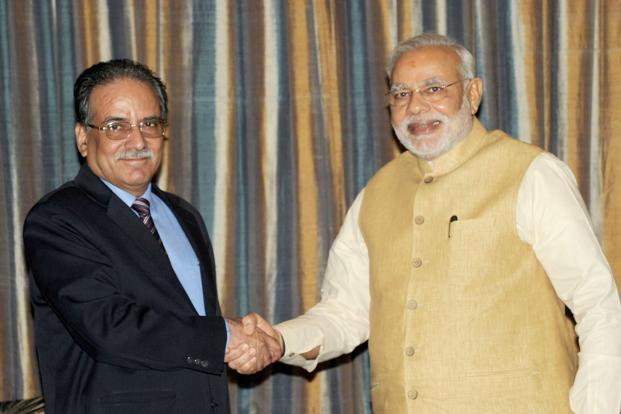
In a recently published article in ‘The Hindu Business Line’ entitled 'China is Nepal's new best friend', the author suggests India deploy its Hindu card to regain the waning friendship and control in Nepal. The author accepts India's shortcomings in its treatment in Nepal but the fact that Nepali leaders decided to opt for a secular country speaks for the author's argument.
The paranoia of India regarding China’s entry into Nepal is true and false. I had recently talked a former Maoist Centre leader and he clearly said that China is inactive and indifferent when it comes in influencing Nepali politick. The new Chinese ambassador Yu Hong is visibly inactive compared to the Indian ambassador Puri. The leader went on to accuse India of meddling with Nepal’s politics and bureaucracy. He boldly said that India doesn’t hesitate to micromanage Nepal and this naked intervention is clear to most Nepalis now. Hence, India is playing a destructive role in pushing Nepal towards China and not the other way around. However, it is true that China is pushing for an active role in Nepal but it’s still trying to figure out the best way to influence, perhaps, economically. The recent signing of One Belt One Road (OBOR) by Nepal is an example of soft power China is exercising. Its effect will only be known after many years.
What India fails to understand at times is that it is indeed Nepal’s old and only best friend. But over the years the leaders of both countries have messed up the relationship. India’s fond for US imperialism has obscured its vision to respect Nepal’s sovereignty. Many experts in Nepal believe that India might have gained independence from the British but it still suffers from post-colonial fever and that reflects in its neighbor policy and diplomacy. This is partly true but on the other hand Nepali leaders are no saints. Their tradition of running to New Delhi for making any decision has discredited them as leaders of an independent country. And it only has complicated the relationship between the two nations.
India’s role in not completing developmental projects in Nepal is evident. Yet the corruption in Nepal should be blamed for that too. If these two nations have failed to strengthen ties on economy, how will it manage to come close because of a religion? The question and answer remains elusive.
The pertaining question of the moment for Nepal is the upcoming second-phase polls on June 29. After Prachanda quit his post, PM Deuba promised to appease Madhesi Morcha so that all parties would participate in the upcoming polls. However, the 40th prime minister has shown signs of inefficiency as Rastriya Janata Party Nepal decided to step out of the second-phase polls, exposing the prime minister to widespread criticism. An indignant citizen tweeted that Deuba was someone who was kicked out from the parliament by the last king of Nepal, Gyanendra Shah, in 2011. Still India has put trust in him by side-lining Madhesis’ plea for constitution amendment prior the upcoming polls.
It appears that India is divided per se regarding Nepal and one section believes India shouldn’t interfere in Nepal’s politics but make sure to not let it go out of its sphere. Another section argues that Nepal should be remade the last Hindu country as it cannot afford to do so. This Shangri-La dream is almost oasis-like and perhaps unattainable given the different between people in the two nations.
Once India understands the divisions within its diplomatic and bureaucratic circle and tries to fix it then only we can hope for a better relationship between the two nations. If not the author’s fear might come true. But let’s not forget that Nepal doesn’t share any commonality with China. Most Nepalis don’t understand Chinese nor they share any values or traditions with the northern neighbor. China is trying to create a bridge but it will take years to make it happen. It’s not impossible though. This is where India should be vigilant about.
Nepalis over the years have gone through unimaginable events: civil war, royal massacre, Maoists joining mainstream politics, new constitution, earthquake, India's second blockade, first local level polls in 19 years, 24-hour power supply and a 7.2 economic growth. All this has happened in every ten years. And no one knows what hold for Nepal in the next decade. But the Himalayan nation is in desperate need for a stable political state with government and prime minister that lasts for 4-5 years. And for that to happen the upcoming polls are important.
Let us not forget that India dismisses any secessionist movement in its soil and it should discourage the same in Nepal. The new alliance between RJPN and secessionist leader C.K. Raut is a fresh warning for these two democratic nations.
India and Nepal share strong cultural ties, have similar religious backgrounds, have fostered cordial relationships in marriage, and can understand each other easily. It would be useful for India to help Nepal in becoming politically and economically stable. When that happens, all misunderstanding will fade away, and India will remain Nepal’s only and oldest best friend. If not, the dragon will inevitably soar high in Nepali skies.
(Arun Budhathoki is Nepal Editor, The Citizen)

